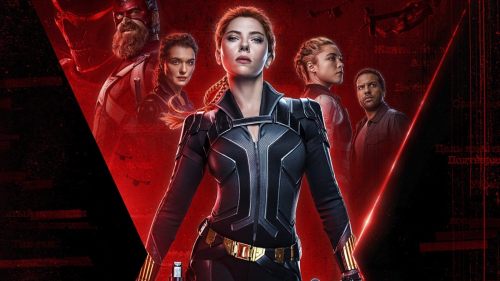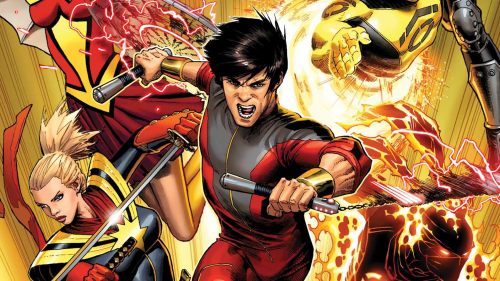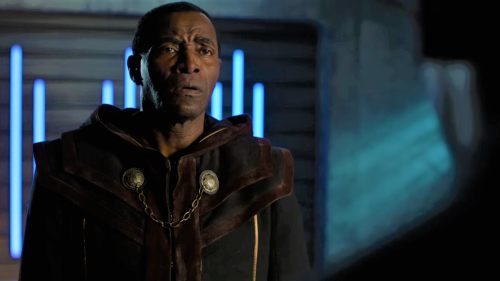AVENGERS: ENDGAME Review: Marvel Nails the Landing
I was not convinced by Avengers: Infinity War. Maybe it’s a lifetime of reading Marvel comics, which are packed with plot reversals, retcons and resurrections, but none of the “big emotional moments” clicked. They seemed like a con. Spider-Man and Black Panther aren’t dead; they have sequels on the way! The conclusion played like a cliffhanger setup in the most classic sense of the word — a story beat that would only really play when the following beat dropped.
Avengers: Endgame is that next beat, and it works in all the ways Infinity War did not. While a handful of story ideas are left unresolved (the better to power more sequels and series for Disney+) the core story does finish, at very long last. Directors Joe and Anthony Russo, and screenwriters Christopher Markus and Stephen McFeely, have slowly built a story of conflicting ideals and ambitions, represented by Captain America (Chris Evans) and Iron Man (Robert Downey, Jr.), and Endgame reaches a conclusion that is not only spectacularly satisfying, but thematically powerful.
Thanos (John Brolin) acquired godlike power in Infinity War, and snapped half of all life out of existence. In doing so, he demolished the foundation on which most of the Avengers had built their identity: The idea that they could fix everything. The world reels, and the surviving heroes, including Cap, Black Widow (Scarlett Johansson), Hawkeye (Jeremy Renner) and James Rhodes (Don Cheadle) struggle to deal with the inescapable weight of total failure.
Then there are the paired opposites, Thor (Chris Hemsworth) and Hulk (Mark Ruffalo), who illustrate very different approaches to grief. Thor is not doing well — and in truth, his personal story is a challenge that Endgame does not meet with great success. Hemsworth is clearly having a great time with the character, but the very broad material is not entirely in step with the rest of the film. Ruffalo’s Hulk, on the other hand, has found an unexpected measure of peace. This Hulk is a definitive evolution of the character, executed splendidly by Ruffalo and the CG artists who finish the character’s realization.
Sidestepping around any questions of plot and specific characters, Endgame has an unusual structure that is appropriate for an event such as this. What would typically be the first act is almost its own movie with multiple arcs that build and resolve before driving the action forward. A section very much akin to HBO’s series The Leftovers offers some of the strongest dramatic material Marvel has delivered in a long time. I’d like to see even more of these characters dealing with being human in a post-snap world where heroes no longer have the same value they once did.
Endgame does dive into more familiar territory, quite literally, as it indulges in a “Marvel’s Greatest Hits” second act before exploding into the inevitable final battle. Throughout, the directors and screenwriters focus primarily on a small group of characters — the core original Avengers, with a couple additions — which allows a tight thematic focus. Endgame is sprawling, but as the filmmakers maintain that focus, this movie plays faster and more effective than Infinity War.
I often find Marvel’s big battle scenes to be frenetic and noisy, and Endgame does not diverge from that tendency. Some fight scenes in this film feel even more quickly, at times viciously cut than in other recent efforts Marvel; I longed for the clarity of the John Wick series.
And yet, moments of character are buried in the fight scenes, especially as characters like Captain America and Thor fight alongside one another. Endgame is packed with ideas that are fan service as often as not. Some character combos come together for million-dollar photo ops, with no meaningful outcome in a story sense. These moments are like a proof of concept simulation, with audience reaction to specific ideas suggesting the direction of future Marvel movies. “Applaud if you want a movie with this crew fighting together!” But if a decade of building towards an event doesn’t earn the right to indulge in those moments, what does? (See also: the final season of Game of Thrones.)
Setting aside the question of which characters live and die, Endgame doesn't create the seismic shift in Marvel's storytelling landscape tentatively promised by the end of Infinity War. It does, however, put everything on the table. Eleven years ago, Iron Man established what now looks like a fairly staid point of origin. Now, every comic book concept is on the table. The stuff once considered too wild for audiences to accept is now de facto mainstream storytelling. Rather than closing things down, Endgame opens everything up. This is a genre film with layers of overlapping Big Ideas, character conflicts that could be flat-out ridiculous if handled with less skill, and deep in-jokes featuring dozens of costumed characters — and millions will see it. That is wild.
Ultimately, Endgame is an entire movie of payoffs. It plays off and completes thoughts begun in Age of Ultron and Civil War, and even in comics. Conventional wisdom says that a sequel should be able to stand on its own. For the past decade, Marvel has worked to make that true, to whatever degree is possible in a series of more than 20 interconnected films. That changes with Endgame, which has no ambition to stand on its own, and no need to. This Avengers finale is an event as much as a movie. It is quite possibly a one-time thing that can only happen at this point in time. Endgame is a giant flex of fan interest and industry power, and in that respect it is spectacular.



